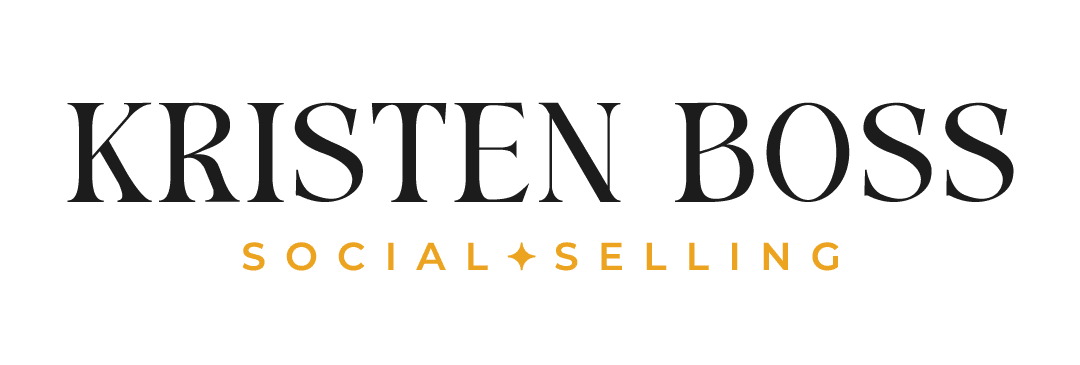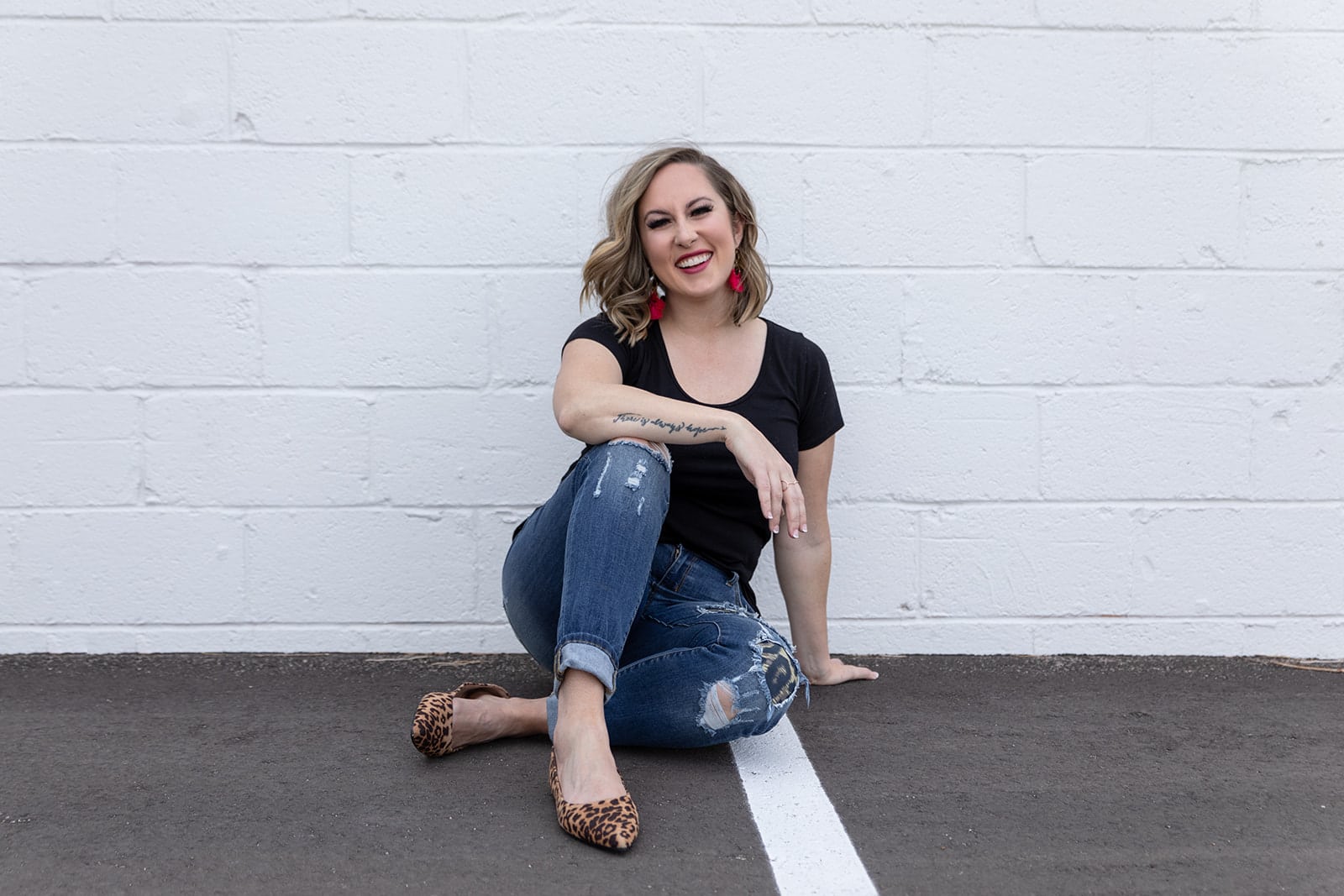As an entrepreneur and business owner, you’ve probably wondered how other successful business owners know when and why to make decisions in order to grow their business. How did they decide it was time to either press the gas or pump the brakes? And how do they keep going after a big setback? After all – being an entrepreneur can feel like you’re stuck on a rollercoaster.
Kristen thinks the key to being a successful entrepreneur is all in how you play the game. Or rather – how you measure success and learn from failure. In this week’s episode, she’s talking about playing the long, sustainable game in order to grow your business in ways you’ve probably not considered.
Here are a few highlights:
- Kristen lays out her Rules of Engagement for entrepreneurs
- How best to learn from failures and painful lessons
- Why staying engaged during losing seasons can build your strength as a business owner
- The importance of anticipating problems in your business
Being an entrepreneur is a constant journey of self-refining and reflection. There is no final destination or end goal because the work is never done. Instead of letting these thoughts trigger feelings of exhaustion, perhaps reevaluating how you measure success can help you see that you’re already successful in ways you’d never thought possible.
Thanks for listening! If you’re ready for high-level coaching and teaching in your network marketing business, check out Kristen’s exclusive Mastermind for six-figure earners in the network marketing industry. Get all the details about the Purpose & Profit 6-Figure Mastermind and join the waitlist here.
Connect with Kristen:
If you’re ready to learn the simple process of running your social selling business online, you have to check out Kristen’s live group coaching program! The Social Selling Academy: www.thesocialsellingacademy.com
Do you have a business full of customers and almost no builders? You’re in need of a reboot! Learn the three skills you can learn that will completely change your recruitment game. Check it out here.
Transcript for Episode #120 Playing the Game:
Kristen Boss (00:05): Welcome to Purposeful Social Selling with Kristen Boss. I’m your host, Kristen Boss. I’m a mindset and business coach with more than 15 years experience in both the product and service based industry. I believe that social selling is the best business model for people wanting to make an impact while they make serious income. This is the podcast for the social seller, who is tired of feeling inauthentic in their business and desires to find a more purposeful and profitable way of growing their business in today’s social media landscape. In this podcast, you will learn what it takes to grow a sustainable business through impactful and social marketing. It’s time to ditch the hustle and lead from the heart. Let me show you the new way.
Kristen Boss (00:48): Hey bosses. Welcome to another episode. Listen, today, I want to talk to you about playing the game and if you are anything like me, maybe you’re competitive. Maybe you are the person where there is blood when it comes to family monopoly night, or maybe you’re like, I don’t want to cause any conflict. I don’t know about family games. I want to talk to you about the greatest game you’ll ever play, and it’s the game of entrepreneurship. And I’m going to share from the context of how I have played the game in the recent three to four years, specifically the last three years when I started my coaching business and how my company grew to over 10 million in such a short period of time and why I was able to do that and how, and it was this concept of playing the game and I really sat with, okay, well, what rules was I playing by?
Kristen Boss (01:42): First of all, if you’ve been in entrepreneurship for any length of time, you’ve probably figured out there is no rule book. And that might be one of the most infuriating parts of entrepreneurship because I get it. I think a lot of people, when they think about starting a job or a career, you know, building their own business, online, being an entrepreneur, what I see a lot of people wanting to do is I see a lot of people looking for a rule book before they start the game. And if you’re like me, whenever I do play a board game, I like to grab the rule book. First. I like to understand the framework of the game. I like to understand the rules so that I feel well equipped and prepared to engage in the game and not just engage in the game. I’m always thinking, how might I know the rules and leverage the rules in order to better my advantage and win the game.
Kristen Boss (02:34): I want a winning chance at this game. So for me, I like to grab the rule book. First thing, here’s the thing with entrepreneurship. There is no rule book. There is no universal rule book that we all grab and play by and say, you know, do this in your ad. Spend do this in your videos, do this with your content, you know, make this offer, do this thing. Do you know, take these exact steps. And you’re guaranteed to have the same exact outcome because likely you may have done that. You may have looked at other successful entrepreneurs and looked at their playbook, so to speak and applied it directly to your business directly to your own life. And you didn’t get the results. And you were wondering why there is no playbook, but there is a way to play the game. I’m going to call it the rules of engagement.
Kristen Boss (03:23): It’s not a strategy. It’s not a playbook, but there are rules of how you can best engage the game of entrepreneurship. So, first of all, I, maybe you’ve never thought of it as a game. Maybe you’ve thought of it as like my next career, my next serious thing. And there’s nothing wrong with that. But sometimes I think we take ourselves way too seriously and we forget to have fun. We forget to enjoy it. We forget to bring playfulness and curiosity and creativity and innovation to this new endeavor and new adventure. And for me, I thought of it as playful and fun and light from the very beginning, I knew I was in it for the long run. I did not now hear this. I did not sit down and write in a journal. I’m going to have a company that makes $10 million in the next three years.
Kristen Boss (04:09): I had no idea it was going to get there. I just knew how I wanted to feel. I knew the experience I wanted to have, and yes, I had goals. If anything, it was, you know, a million dollars in three years and we’ve 10 Xed that, and there were decisions I made. I believe that got me to that point. And I want to share them with you because I don’t believe in keeping secrets. I want to help you understand the rules of engagement to better your chances of enjoying the game, playing the game well and winning at the game. But here’s the thing you need to know. You have to understand you’re going to lose. You’re going to lose. At some point, you’re going to lose the game. You’re going to have, you know, a losing turn you’re going to, you know, do not pass, go do not collect $200, go straight to jail.
Kristen Boss (04:54): You’re going to have those moments of entrepreneurship. And it’s part of the game. It is part of the game. Pain is a part of the game, painful lessons and failure and setbacks are all a part of the game. But sometimes when we’re not understanding that when we do have those setbacks and disappointments, we think something’s gone wrong. Or we start looking for the rule book because we assume like, wait, it shouldn’t be like this, but actually it very much should be like that actually is required for you to have failure and setbacks and disappointment. And I’m sure you’ve heard that from many people before. And we say, yeah, you know, I’m going to fail forward, but still we are not designed to desire that as humans, we have a brain that’s like, Nope, failure is just not an option. I’m terrified. You know, we don’t, we don’t treat it like this fun light game.
Kristen Boss (05:44): I think some of you might be treating this like squid games, like it’s life or death on the line here. I either, you know, make the millions and the, you know, the last one out wins like hunger games type of thing that is not well entrepreneurship is. And I think sometimes when we’re in a posture of scarcity, it does become that. It does become like I have to be the best. I have to be the fastest and I have to get there before everybody else. Because if I don’t, somebody else is going to get there before me and I’m going to lose all my chances. Now I’m not saying having a healthy sense of competition and a healthy sense of urgency is a bad thing by all means. I actually think that’s really good. I love the concept. Even for me at this place in my business, I love the concept of thinking that somebody else out there is working harder than me.
Kristen Boss (06:29): Not in the sense of like blood, sweat, and tears, and they’re giving up their livelihood, their life and their mental health. If you’ve been following me any length of time, you know that, you know, I’m about scaling with profitability and peace, a peace of mind and with purpose and sustainably sustainability is everything. But I like to think there’s no such thing as being at the top of your game. There’s no such thing as arriving because there are better players out there. There are people that have been doing this longer than you. They are better at this than you. And I love that. I love knowing I’m not at the top of my game. And honestly, I hope I never have that thought. Like I’m at the top of my game, I’ve arrived because this game, as Simon Sinek says, you know, play the infinite game.
Kristen Boss (07:10): And I really believe that entrepreneurship truly is the infinite game because entrepreneurship has really just a personal development program. Like you want to learn all of your stories, expose all of your weaknesses, all of the, all of the areas that are so easy to keep hidden when we are not going for hard things and going out of our comfort zone, like entrepreneurship has a way of exposing our stories and we can choose to run from them or heal them. And so I feel like entrepreneurship is a constant refining journey next to my marriage. I feel like it is the most refining thing that I have ever done in my life because it has changed me so profoundly. So this concept of like, listen, we never arrive. Even in our personal development journey, we’re never there, but I think we like to believe that we, we think we’d like to believe when I get there, I get to just relax, kick up my feet.
Kristen Boss (08:01): And I, it doesn’t have to be hard anymore, but I think as long as we are desiring to be good humans who contribute to the world, contribute to others and make an impact to the work is never done. We don’t get to put our feet up, but not saying we don’t get to enjoy it. Not saying it’s not fulfilling just for me. I’m like, I know the work is always there in the best way. Not an exhausting way. If you think if that, if that idea exhausts you, if you’re thinking, oh my gosh, the work is never done. And you just want to run and hide and never resurface. That would tell me there’s not enough fun and joy in how you’re playing the game right now. So let’s talk about the rules of engagement. First of all, when you enter this game, you have to be willing to take your losses.
Kristen Boss (08:42): Well, you have to understand you’re going to lose and you have to take them well. Anybody can have a great winning at when they’re winning. Anybody can be happy and have fun. You know, no one likes a gloat. Uh, but you know, know anybody can have a great attitude when they’re winning, but who are you when you’re losing? Who are you after you’ve taken a loss that is more of a defining moment than who you are in a winning season. And a lot of times I think people define themselves by who they are in their winning season. Like I almost think of like, when people look back at, you know, certain seasons of their life and they say, you know, those were the best days of my life. It was like, that was my winning season and everything else me. Right? But this idea of, I really believe your greatest character development and where you are refined and where all of your lessons are.
Kristen Boss (09:29): All of your million dollar, $10 million lessons are, is in your losses is when you’re in a losing season. Who are you? What decisions are you making? Have you just thrown in the towel and said, this isn’t for me. You know, I have a five year old and a six year old and they’re close in age and they’re just now starting to get into board games. They love it. It’s so fun. But what we are having to teach them is how to have a good losing attitude, you know? And we also have to tell them like, Hey, don’t gloat. When you win. That’s not nice to gloat with your little sister and be like, ha ha. I win you. Didn’t like, there is that. Like, we teach them not to be smug and to be humble. But one of the, the biggest lessons with our children right now is how they are taking their losses and the conversation we have around the losses.
Kristen Boss (10:16): And a lot of times what, what I see my kids do, and maybe you do this, what happens is I see my kids as we start to get towards the end of the game, they notice that somebody is starting to edge ahead in the game and in their little brains, I see them assess the situation and they’ve decided I’ve already lost. What’s the point. And I’ve literally seen my children, like throw the ponds on the board and proceed to walk away. And we say, you have to stay engaged in the game all the way to the end, because you never know what will happen. And I just remember this happened with like with candy land, you know, you can draw a card and suddenly, you know, you could be really close to, you know, what is it? Popsicle mountain. I don’t know, you can be really close to the wind.
Kristen Boss (10:59): Like you can smell it. And then the next card they draw, someone can go all the way back down to candy can land. And you know, that, that was, that was what exactly what happened with my kids is they, my son, he saw his sister pulling ahead. He saw her moving towards the finish line. And in his mind he assessed the board and decided the game’s already done. I’ve already lost. And he wanted to walk away in frustration. And it was a teaching moment for him. I said, you know, Caden, you need to sit here and you need to see this game through. You never know we’re going to play until the last card is drawn. This is the game. It isn’t over until it’s over, but we’re going to keep playing because you never know what’s going to happen. And sure enough, you know, my daughter, she drew her card.
Kristen Boss (11:44): She had to go all the way back to candy. Candy can land land. And she was able to laugh about it. She’s like, oh no, I’m all the way in candy can land. But my son saw how quickly the game could change in an instant. And this is why. And in that moment I knew that was a really profound lesson for him to learn the game’s not over. And there’s always ma there could be magic around the corner. There could be something that happens to your advantage around the corner, if you stay engaged in the game, but he wanted to leave because he couldn’t take his loss as well. And I get that. That was part of, you know, I was an incredibly competitive child and an incredibly competitive board game house. Like my husband, one of his favorite memories of me was he was dating me.
Kristen Boss (12:27): And I think I was playing settlers of QAN with my sister and my sister. And I, we have had serious conflict in our relationship with how competitive we get. And I could tell a lot of stories, but you know, my husband came and, um, my now brother-in-law was there as well was there as well. And it was, you know, us couples with each other and it got to name calling. It got to like being like, I’m never speaking to you again. And my husband was just like, looking between us, like, what family am I marrying into and we still talk about it to this day. He’s like, I’ll never forget that. That was what I saw. You know, the real side of you. I was like, what? My competitive side, you you’re marrying into this. So, you know, I had to learn how to take my losses.
Kristen Boss (13:15): Well, too. And in the game of entrepreneurship, when you were engaging in the game, engage in the entire game, engage all the way through. Don’t just engage when you think you’re winning. And as soon, and I see entrepreneurs do this, I see so many business owners, they kind of look at what’s currently happening on the game board. They look at what’s currently happening in their business and they make permanent decisions because they’ve looked at the board game and said, it’s already done. It’s over. There’s no chance I’m walking away. I’m going to cut my losses. Now, before it’s too painful, where I lose everything. And some of the most successful people like billionaires are people that declare bankruptcy, not just once, but twice. Like they are people that are willing to play all the way. Like they engage in the entire game. And even when it’s big losses, they don’t walk away forever.
Kristen Boss (14:07): They reengage in the game. And I really believe it’s because they love the game. That much, they love who they become in the game. That even when it’s, they’re losing, they’re like still worth playing. I know that’s true for me. I know I had a lot of setbacks and a lot of losses and frustrations. And you know, for me, I loved the game so much. I loved who I be, who I was becoming. I loved the vision. I loved the goal. It kept me engaged in the game. But if you don’t have a strong enough compelling vision or a why it’s going to be harder to engage in the game when you’re, when you’ve had a couple losses when you’ve had repetitive losses. Because oftentimes I, I believe sometimes entrepreneurship is, you know, I don’t want to say like gambling, but it can feel that way where you’re taking bets.
Kristen Boss (14:54): Are you willing to bet on yourself? And it’s not, you know, the house always wins an entrepreneurship. It’s just, am I willing to bet on me? Am I willing to go all in on me? Or am I only wanting to guarantee? And, uh, engineer guaranteed wins for myself. There is no such thing. We cannot go out and guarantee our wins. We want to grab that playbook and just get a lay of the land and have a, the promise that it’s, we’re going to win. But it’s, we’re not always promise that, but we still decide, okay, I’m going to engage. I’m going to stay in this game because I like going, becoming, I like what I’m learning. I like what it’s teaching me about life, actually. And I’m going to say this entrepreneurship has 1000% made me a better human. It has brought so many things to the surface that I didn’t know I needed to work on.
Kristen Boss (15:44): And I’m so thankful. And that’s why I’ll keep playing this game even in a losing season. And also when you engage in the game, you need to have a strategy. You need to be looking at the landscape and constantly assessing. I tried to play chess with my husband once on our honeymoon. And I’m actually recording this on our 10 year anniversary and we’re celebrating tomorrow. And he taught me chess. And what I liked about the game was how you’re not just thinking about your current move. You’re thinking about the move five moves from now. You’re thinking about your move. And then you’re thinking about all of your opponents potential moves against you and strategizing for that. And I think business is very similar. I think business, we must be, if you want to engage in the game, well, you have to be proactive and strategic.
Kristen Boss (16:34): You need to be looking not just at the current landscape of the board, but where you might potentially see the board changing and moving and anticipating for that solving for that. And always thinking three to four moves ahead. And I know that was true for me is when I started my company, I was looking at where I saw the industry. I was currently serving and still currently serving. I was looking at, where do I see this industry headed in the next three to four years? What problems can I anticipate arising? Now I did not anticipate the pandemic and how that would influence that industry. But now I’m looking at it. I’m looking three to four years ahead and saying, okay, what now? What’s different now, how might these marketing tactics create certain results two years from now? How might this work? How might that flush out?
Kristen Boss (17:24): And an entrepreneur by definition is somebody who an not only solves problems, but I believe the best entrepreneurs anticipate problems before they happen. They’re looking for, okay, what if I’m thinking three moves ahead? What might I do? And that was constantly for me. And I’m always solving, even in my programs and in my offers, I’m thinking, okay, we currently have 4,000 students in this one program. I’m going to start solving for having 10,000 in there. And how might might we serve for that? What problems can we see arising? If we suddenly double the academy overnight, if we suddenly double this offer, what might I need to do to change the infrastructure to my company, change the infrastructure, you know, with how much support contractors I have on, or, you know, who do I need to hire? What might we, we need to do? What software upgrades might we need?
Kristen Boss (18:12): What do we need to change with our onboarding process? What needs to change with the message, what needs to change with our selling? Do we close the doors to slow down the demand in order to serve people better? Like we have to be thinking about these things. And for me, I’m usually thinking 12 to 18 months ahead and right now, and I never thought I would be that person. I never thought that would be me, but that is what is one of the best ways to engage in this game is thinking about the end game. And I know I’m saying like play the infinite game, but thinking about here’s where I’m wanting to go in the next two years and reverse engineering it from there and engaging with the strategy, expecting obstacles, expecting failure, expecting losses, and saying, okay, I’m going to take all my lessons.
Kristen Boss (18:57): I’m going to take the loss. I’m going to have a winning attitude. I’m going to reengage in this game because it’s what matters to me, because I like who I’m becoming in this game before all the results happen before I collect in on the cash. I like who I’m becoming is that you, is that what you’re thinking when you’re thinking about this game that you have decided to play. And I also just want to offer. It’s so interesting. I grew up playing volleyball and you know, you always want to be recognized as a great player. And we put a lot of value, obviously on MVP. Who’s the team MVP who is the most valuable player. And we tend to think that is, you know, the height of recognition, it’s the best accomplishment to have. How can it be the most valuable, but here’s what I want to offer you when you engage in the game of entrepreneurship is endeavor to be the most improved player.
Kristen Boss (19:48): Don’t just say, I want to be the most valuable I would, I would say aim to be the most improved because that’s for anybody, anybody can improve the most valuable. That’s great. I love thinking about how I can be more valuable to my audience, my customers, the people I talk to, the people I serve. But for me, I honestly think I want to be the most improved. Every time I want to see a, a sincere and serious before and after with everything I engage with. Am I better after having engaged with this part, am I better after pursuing this? Am I a different person? What are the metrics? What are the measurables and the tangibles to, to show that I have seen massive improvement aim to be the most improved player. And I kind of said this a little bit earlier, but this concept of betting on yourself and understanding that the game has has risks.
Kristen Boss (20:41): That is part of engaging in this game. You do have to know that with playing the game comes risk. It does come with risk and the currency of the game. Like if we’re to set out the board game of entrepreneurship and there’s a banker, you know, handing things out, you’re given two currencies. You’re given time and you are given energy. And as an entrepreneur, we are always deciding between the two. We’re always deciding time, sorry, time, energy, and money. Let’s do three. There’s three of them, time, energy, and money. Those are your three currencies as an entrepreneur. And with every opportunity that we sit in front of and every way to grow, to grow our assets, to grow our company, to grow the vision, you have to use one of those three currencies. And eventually you, you end up being very strategic with your currencies as you learn more and as you stay engaged in the game longer, but those are it.
Kristen Boss (21:40): It’s either going to, it’s going to cost you time, energy or money, sometimes all three, depending on how big you go. And I think you need to look at, you know, the size of your dream. You have to understand that is relevant to the amount of currency. It will cost you time, energy, and money. It’s always all of those three or one of those three. And you’re going to learn to be very efficient with how you spend those things. And sometimes you’re going to be like, man, I spent way too much of my energy. Now I’m depleted there. And that was very costly of me. So next time I’m going to save the energy and outsource and spend the money you’re going to learn these things. That was huge for me. You know, in the beginning, when I first started my company, I was a solo entrepreneur. It was just me.
Kristen Boss (22:28): So the amount of energy expenditure was so high because I didn’t the resources of time. Weren’t as high for me at the time they weren’t accessible. So I had to bootstrap things. I was making my own things. And eventually when I started growth, I had to think, okay, I can choose to keep expending my energy here, but now that I have some income, I need to be thinking about what might I do better with this currency of money that I have instead of the currency of my energy and how might I leverage that? And then you understand part of the game is leveraging your current currencies. What do I have that I can leverage right now? Energy time or money and where do I need to get scrappy? How can I create more energy and money? Now? Listen, time is a non-renewable resource. That’s it?
Kristen Boss (23:17): Time? It is fixed. That is it how you spend your time. That’s why time is so precious. That’s why I say, if it saves you time, I believe it also saves you money and you can make more money, but this is part of the game. Also, you have to understand your opponent and you might be thinking, oh, the opponent is my competition. Actually, I, I just think there are other players that are playing their own game. We are all sitting at the board with our own game. And our greatest opponent is ourselves. The person who’s sitting across from us, making moves and potentially getting in our way or helping us is ourselves. I am my greatest opponent. You are your greatest opponent. You are, you are playing this game against yourself. You’re playing this game against the current version of you. While you are wanting to get to your future version.
Kristen Boss (24:01): Your current, the current version of you is going to be fighting tooth and nail to keep the status quos going to say, how can I keep you here? Because there’s too much risk. That’s scary. How much, how much currency is that going to cost me? You are playing this game against yourself and nobody else. So it literally doesn’t serve you to look at anybody else’s board game and think, wow, they’re like 15 moves ahead of me. Well, have they been playing that longer than you? Or maybe they’re playing a completely different game than you are. It doesn’t matter again, if you’re aiming to be the most improved player with yourself and you’re, how are you measuring your success? How are you measuring how well you’re playing this game? If it’s only by, you know, money in the bank, if that is your only metric of success, this is going to be very frustrating game for you because it’s not Al money’s not always flooding in.
Kristen Boss (24:51): It’s not always, you know, feeling like a, you know, winning the lottery experience. It doesn’t always feel that way. And if that’s your only metric of success, you’re going to find a lot less joy in this journey. Instead of like, what are all the other markers of success that I can gauge my progress by? What’s my fulfillment in my life. What’s my personal life. Like what’s my family life. Like, what’s my sense of peace. Am I taking care of myself? How am I engaging in life outside of my business? Am I making meaningful relationships? Those are markers of success. So what I want to offer you when you’re thinking about the game of entrepreneurship, I want you to be all in, on all parts of the game, because most people they’re only all in on the fun parts, the part where all the money is rolling in, where it’s fun and you’re winning and everybody’s applauding you.
Kristen Boss (25:45): That’s only like 10% of the game. The other 90% is losses, risk learning, setbacks, disappointment, healing. You have to be in on all of it. And maybe you haven’t, you haven’t decided that yet today. Maybe you’re just like, oh yeah, I’ve only been playing one, one component of this game. No wonder it’s been miserable because only 10% of the game is like that. And this other 90% of the game I haven’t opted into, I haven’t said, yep, I’ll play the game. I’ll still play it. Like here’s the risks. Here’s all. Here’s how you engage. Here’s the rules of engagement with this game. Do you still want it? And if the answer is yes, if you understand all the rules of engagement, understanding like your personal development is priority. Number one in this game, you can’t just be developing a business without developing yourself. There they go hand in hand.
Kristen Boss (26:39): And I know for me, the more I worked on myself, the better it served my business. The more I learned things about myself and sat with myself and became way more self-aware it absolutely has a, had a positive return on my business, but self-awareness and learning and growing and healing is painful work. And if you’re not interested in that, then you might not enjoy the game of entrepreneurship. But if you want to engage in your healing and bettering yourself as a person and as a human this game is for you. So today, think about, am I fully engaged in this game? And why is it worth me engaging in this game? Even when it’s hard, even when I’m taking losses, when you do that, you’re going to have a lot more fun playing the game of entrepreneurship.
Kristen Boss (27:32): That wraps up today’s episode. Hey, if you love today’s show, I would love for you to take a minute and give a rating with a review. If you desire to elevate the social selling industry, that means we need more people listening to this message so that they can know it can be done a different way. And if you are ready to join me, it’s time for you to step into the Social Selling Academy, where I give you all the tools, training, and support to help you realize your goals. In the Academy, you get weekly live coaching so that you are never lost or stuck in confusion. Whether you are new in the business or been in the industry for a while, this is the premier coaching program for the modern network marketer. Go to www.thesocialsellingacademy.com to learn more.










